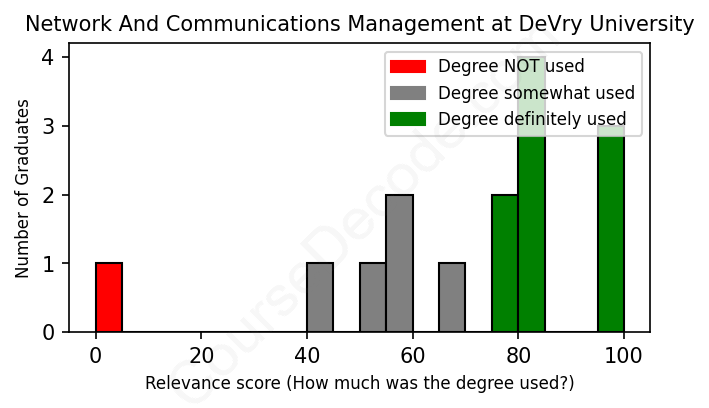
First, some facts. Of the Network And Communications Management graduates from DeVry University we've analyzed , here's how many have used (or NOT used) their degree in their career:

These are estimates based on AI analysis of 15 LinkedIn profiles (see below).
The verdict? Slightly above average. Overall, with an average relevance score of 70%, Network And Communications Management graduates from DeVry University have a slightly higher likelihood (+3%) of finding work in this field compared to the average graduate across all fields:
And for comparison, here's the chart for all profiles we've looked at across all degrees.
Also, after graduating, only 33% of these graduates have pursued further education other than another Bachelor's degree (such as a Masters degree or other), compared to the average across all profiles of 35%. This suggests a Bachelors degree is enough for most Network And Communications Management graduates, and it's normal to look for work straight after graduation.
See the details:
|
Relevance score: 95% We think this person has gone into a career highly relevant to their degree. We think this person has gone into a career highly relevant to their degree.
DEGREE INFOGraduated in 2014 from DeVry University with a Bachelor of Science (BS) in Network And Communications Management. Also pursued further education since (see below). JOB HISTORY SINCE GRADUATIONProduct Owner Lumen Technologies Mar 2021 - Jun 2024 Open to New Opportunities  Self-employed Jun 2024 - Present FURTHER DEGREES DONE SINCE GRADUATINGMaster of Business Administration (MBA)University of Phoenix 2014 - 2016 Master of Global Management Thunderbird School of Global Management 2016 - 2019 Master's degree Thunderbird School of Global Management 2017 - 2019 ABOUTRelevant Education and Certifications:Master of Global Management - Thunderbird 2019MBA - University of Phoenix 2016POPM - 2022APM - 2023Experience:Product owner - managed agile development of legacy and predictive analysis of datasets for all North American customer base. Worked with business teams to brainstorm and problem solve to garner solutions for development. Devised Epic down formulation for agile development path. Solutions Engineer- Worked with various technical teams to understand their processes and procedures in order to document and develop tools for automation with development team. |
The top 10 most common jobs done by the graduates we've analyzed (ranked most common to least) are:
When looking at the job paths of people who graduated with a degree in Network and Communications Management from DeVry University, you can see a mix of roles across different sectors. Many have landed jobs as Network Administrators, Systems Analysts, and IT Support Specialists, which are all closely linked to the skills they learned during their studies. These roles not only engage their networking and communication knowledge but also allow them to apply it in real-world scenarios, making those positions highly relevant. Additionally, jobs like Voice Communications Engineer and Cyber Security Manager demonstrate a direct application of their degree, focusing heavily on the specialized skills in networking and communications systems.
However, not all job choices reflect a direct link to their degree. Some graduates found themselves in roles like Sales Associates or positions that focus more on customer service and general tech support, which often do not require the in-depth technical knowledge associated with Network and Communications Management. Even within technical roles, some positions, such as Desktop Support or product support roles, may involve a limited application of their degree training. So, while there's a good number of graduates successfully leveraging their education in relevant fields, there’s also a significant portion exploring paths that veer away from the core expertise of their degree.
Here is a visual representation of the most common words in job titles for Network And Communications Management graduates (this is across all Network And Communications Management graduates we've analyzed, not just those who went to DeVry University):

Based on the LinkedIn profiles of graduates from DeVry University's Network and Communications Management program, it seems like most people are on some solid career trajectories. Many of these grads land their first job in roles related to IT support, network administration, or security, which makes sense given the technical skills they develop during their degree. For instance, grads from 2010 and 2012 took relevant positions in network infrastructure and security systems right after graduation, setting a strong foundation for their careers. It's pretty common to see these first roles act as stepping stones, leading to mid-level management or specialized positions in the tech or cybersecurity fields within a few years.
As for what happens 5 to 10 years down the line, many graduates appear to transition into more senior roles, such as network operations managers and cybersecurity analysts. Those who initially started in support roles often move up to supervisory or management positions. For example, a grad who started as a voice communications engineer ended up working as a network operations manager for the army, followed by positions as a cybersecurity manager and analyst. Overall, while there are some outliers who ventured into unrelated fields, the majority of these grads have successfully carved out impressive careers in the technology sector, particularly in network and communications-related roles. It looks like a degree from DeVry in this field often leads to a stable and rewarding career path!
Honestly, a Bachelor’s degree in Network and Communications Management can be a bit of a mixed bag when it comes to difficulty. At DeVry University, the program is structured to give you a solid understanding of networking concepts, but it’s also designed to be accessible for students who might not have extensive tech backgrounds. The courses can involve some challenging material, especially if you’re diving into complex networking protocols or security topics, but many students find the hands-on labs and projects really help solidify their understanding. So, if you’re someone who enjoys technology and is willing to put in the effort, you’ll probably find it manageable—maybe even easier than some more traditional degrees. Just be ready to dedicate some time to studying and practicing what you learn!
Most commonly, in the LinkedIn profiles we've looked at, it takes people 3 years to finish a Bachelor degree in Network And Communications Management.
Alright, so checking out these DeVry grads, it looks like some have really climbed the ladder in their careers while others have taken a bit of a detour. The ones who started in roles like Physical Security Coordinator and then moved into network security and management positions definitely seem to have landed decent gigs, especially with salaries likely bumping up as they gain more experience. For instance, the grads who worked at the US Army in cybersecurity roles probably banked good money, since those positions are pretty respected and well-paid. But there are also folks who started in more entry-level jobs and haven’t moved much beyond that, potentially hindering their earnings. Overall, while some graduates are likely making solid cash now, others might still be working their way up, so it's a mixed bag!
Here is a visual representation of the most common words seen in the "about" section of LinkedIn profiles who have a Bachelor degree in Network And Communications Management (this is across all Network And Communications Management graduates we've analyzed, not just those who went to DeVry University). This may or may not be useful:

Here are all colleges offering a Bachelor degree in Network And Communications Management (ordered by the average relevance score of their Network And Communications Management graduates, best to worst) where we have analyzed at least 10 of their graduates:
| College | Score | Count |
|---|---|---|
 DeVry University DeVry University
|
70 | 15 |